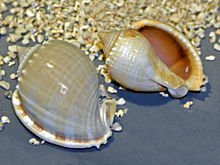Gray snail
| Gray snail | ||||||||||||
|---|---|---|---|---|---|---|---|---|---|---|---|---|

Housing of Phalium glaucum |
||||||||||||
| Systematics | ||||||||||||
|
||||||||||||
| Scientific name | ||||||||||||
| Phalium glaucum | ||||||||||||
| ( Linnaeus , 1758) |
The gray helmet snail ( Phalium glaucum ) is a snail from the family of helmet snails (genus Phalium ), which is widespread in the Indo-Pacific and feeds on sea urchins .
features
The large snail shell of Phalium glaucum has a highly inflated, smooth, shiny body and a short, conical thread. The whorls have strong, angled shoulders with a series of pointed tubercles. The outer lip of the case mouth is thickened and heavily serrated on its inner edge. The surface of the house is creamy white with light brown spots, the inside of the case mouth is dark brown. The house reaches around 9 cm, sometimes up to 12 cm, in adult snails.
distribution and habitat
Phalium glaucum is distributed in the Indo-Pacific from the East African coast and Madagascar to Melanesia , north to Japan and south to northern Queensland . The snail lives on sandy subsoil, especially on sandbanks and near dead corals in the intertidal zone and down to depths of around 10 m.
Life cycle
Like other helmets, Phalium glaucum is separate sexes. The male mates with the female with his penis . The female lays the eggs in clusters of numerous horny egg capsules, each containing several hundred eggs. Most of the eggs develop into embryos. The pelagic phase of the Veliger larvae from hatching from the egg capsule to metamorphosis into the finished snail takes about two months.
food
Phalium glaucum feeds on sea urchins , especially sand dollars .
Web links
- Fischhaus Zepkow: Family Cassidae - Helmet snails
- Cassidae - Helmet and bonnet shells (identification key for the helmet snails , English, on the FAO website ), p. 537: Phalium glaucum (Linnaeus, 1758). From: JM Poutiers: Gastropods . In: Kent E. Carpenter, Volker H. Niem (Eds.): FAO Species identification guide for fishery purposes. The living marine resources of the Western Central Pacific. Volume 1: Seaweeds, corals, bivalves and gastropods. Food and Agriculture Organization of the United Nations, Rome, 1998.
Individual evidence
- ↑ Deepak Apte (2004): Molluscan Fauna of Point Calimere Wildlife Sanctuary Part 1: Gastropoda. Journal of the Bombay Natural History Society 101. Bombay Natural History Society, Bombay 2004. pp. 201-210, here 203.
- ↑ Peter KL Ng, Richard Corlett, Hugh TW Tan: Singapore Biodiversity: An Encyclopedia of the Natural Environment and Sustainable Development. Editions Didier Millet, 2011. p. 246.
